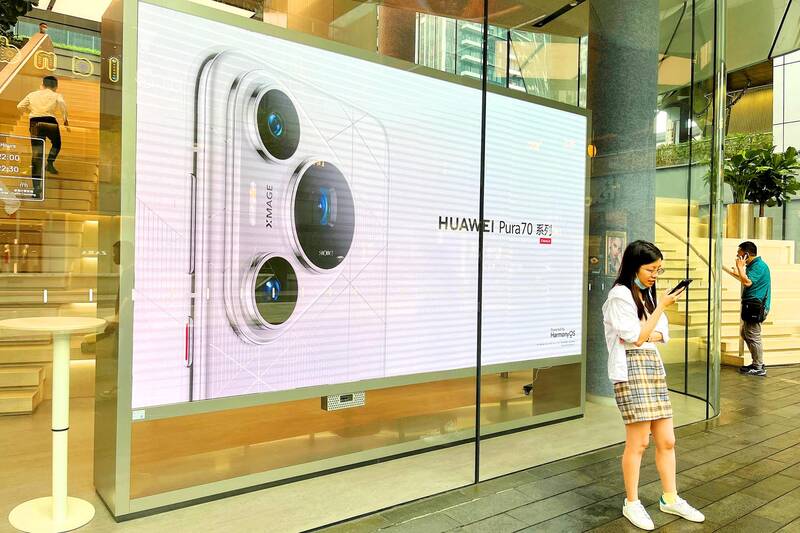Huawei Technologies Co’s (華為) latest smartphones carry a version of the advanced made-in-China processor it revealed last year, results from an independent analysis showed.
This underscored the Chinese company’s ability to sustain production of the controversial chip.
The Pura 70 series unveiled last week sports the Kirin 9010 processor, research firm TechInsights found during a teardown of the device.

Photo: Reuters
This is a newer version of the Kirin 9000s, made by Semiconductor Manufacturing International Corp (SMIC, 中芯) for the Mate 60 Pro, which had alarmed officials in Washington who thought a 7-nanometer chip was beyond China’s capabilities.
Huawei has enjoyed a resurgence since the debut of its Mate 60 series in August last year, riding a wave of celebration around its ability to realize sophisticated semiconductor manufacturing despite escalating US technology export curbs.
The Pura 70 series sold out within two days of its launch, market checks by Jeffries Group analysts led by Edison Lee showed.
US officials are now weighing additional sanctions intended to ring-fence the company and China’s semiconductor ambitions more broadly.
The Pura contained a Kirin 9010 manufactured by SMIC’s so-called 7-nanometer N+2 process, an enhanced version of the typical 7-nanometer manufacturing, said TechInsights, which was the first to identify the original 9000s in conjunction with Bloomberg News.
Formerly known as the P series, the Pura line has traditionally sold on the strength of their camera capabilities.
Giving domestic users a fresh option could apply further pressure on the iPhone, which is not due for an upgrade until September.
Huawei is likely to see further market share gains ahead of the June 18 sales festival, Jefferies said.
For Huawei, it is another step toward rebuilding a consumer business devastated by sanctions imposed by the administration of then-US president Donald Trump.
The company was roughly on par with Apple Inc in the Chinese market in the first quarter, underscoring the way it has eroded the iPhone maker’s domestic market share over the past months.

When Lika Megreladze was a child, life in her native western Georgian region of Guria revolved around tea. Her mother worked for decades as a scientist at the Soviet Union’s Institute of Tea and Subtropical Crops in the village of Anaseuli, Georgia, perfecting cultivation methods for a Georgian tea industry that supplied the bulk of the vast communist state’s brews. “When I was a child, this was only my mum’s workplace. Only later I realized that it was something big,” she said. Now, the institute lies abandoned. Yellowed papers are strewn around its decaying corridors, and a statue of Soviet founder Vladimir Lenin

UNCERTAINTIES: Exports surged 34.1% and private investment grew 7.03% to outpace expectations in the first half, although US tariffs could stall momentum The Chung-Hua Institution for Economic Research (CIER, 中華經濟研究院) yesterday raised its GDP growth forecast to 3.05 percent this year on a robust first-half performance, but warned that US tariff threats and external uncertainty could stall momentum in the second half of the year. “The first half proved exceptionally strong, allowing room for optimism,” CIER president Lien Hsien-ming (連賢明) said. “But the growth momentum may slow moving forward due to US tariffs.” The tariff threat poses definite downside risks, although the scale of the impact remains unclear given the unpredictability of US President Donald Trump’s policies, Lien said. Despite the headwinds, Taiwan is likely

UNIFYING OPPOSITION: Numerous companies have registered complaints over the potential levies, bringing together rival automakers in voicing their reservations US President Donald Trump is readying plans for industry-specific tariffs to kick in alongside his country-by-country duties in two weeks, ramping up his push to reshape the US’ standing in the global trading system by penalizing purchases from abroad. Administration officials could release details of Trump’s planned 50 percent duty on copper in the days before they are set to take effect on Friday next week, a person familiar with the matter said. That is the same date Trump’s “reciprocal” levies on products from more than 100 nations are slated to begin. Trump on Tuesday said that he is likely to impose tariffs

HELPING HAND: Approving the sale of H20s could give China the edge it needs to capture market share and become the global standard, a US representative said The US President Donald Trump administration’s decision allowing Nvidia Corp to resume shipments of its H20 artificial intelligence (AI) chips to China risks bolstering Beijing’s military capabilities and expanding its capacity to compete with the US, the head of the US House Select Committee on Strategic Competition Between the United States and the Chinese Communist Party said. “The H20, which is a cost-effective and powerful AI inference chip, far surpasses China’s indigenous capability and would therefore provide a substantial increase to China’s AI development,” committee chairman John Moolenaar, a Michigan Republican, said on Friday in a letter to US Secretary of